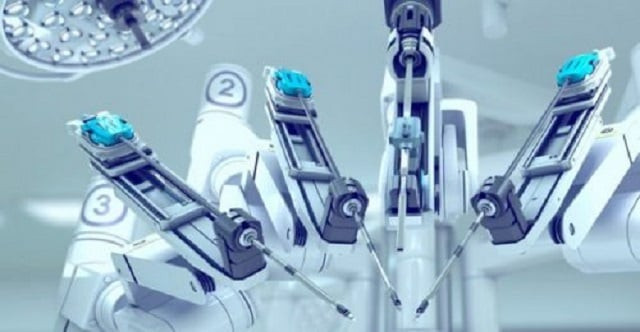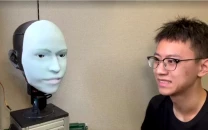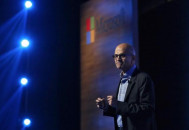Robotic surgery offers operations from distance
Technology allows doctors to operate on patients who are not physically in the same location

PHOTO: REUTERS
Over the years, it has taken an important place with the way operations are currently carried out. However, robotic surgery did not make its way into the medical field as quickly as expected due to the high costs involved. A single robot costs around $2 million, and when its maintenance costs are factored in, it becomes a tool that requires a large budget for hospitals.
Oktar Asoglu, a professor at Istanbul’s Maslak Acibadem Hospital, talked about robotic surgery technology after operating the device, with the attendance of Deniz Unay, a social media expert, who observed the operation.
Asoglu evaluated the three basic elements of robotic surgery, including doctor-dependent and patient-dependent advantages as well as the weaknesses and strengths of the device.
From rundown Badin school to robots in Sweden
“With the help of current technology, patients in New York, Tbilisi or Baku can technically be treated from Istanbul," said Asoglu, who is an expert in robotic surgery.
He said the surgeon can operate even if they are not physically available - for instance when they are sick."However, the only obstacles are the laws and regulations of countries. Surgeries cannot be operated between two different countries," he added.
Asoglu went on to say that the number of surgeons able to operate such devices is another problem."It is not very easy to find an experienced surgeon. For example, a surgeon can perform approximately 70 robotic rectal surgeries effectively, which is quite a high number, when compared to hospitals, which are capable of approximately 10 rectal surgeries annually."
"In Turkey, there are roughly 4,000 rectal cancer patients, and 2,000 to 2,400 of them are estimated to be in need of surgery. It is very difficult to reach the number," he said.
Asoglu stressed that another obstacle ahead is the problem of centralisation in European countries; that is to say, the collection of certain cases in certain centers. Centralisation - the procedure of collecting data of actual operations - also helps training surgeons as well as improving the artificial intelligence of the robots, he added.
"Abroad, European countries such as the UK and France solved this problem. With the help of centralisation, we must train our surgeons very well so they can perform their operations everywhere in the world, just as an American surgeon can remotely perform surgery in his country on a patient in Turkey," he added.
Speaking about patient-dependent characteristics of robotic surgery, Asoglu said delicate surgeries can be used as a substitute such as a laparoscopy - a type of surgical procedure that allows a surgeon to access the inside of the abdomen and pelvis without having to make large incisions.
Virtual reality boom brings giant robots, cyberpunk castles to China
"Especially in narrow-body cavities or in complex surgeries, there are areas where laparoscopic surgery and robotic surgery can be used as substitutes for each other," he said."Thus, surgeons should be able to operate in both ways very well, depending on the patient and the disease. The important thing here is to know which method should be used for which patient," he added.
Asoglu underscored that surgeons can be trained in university hospitals with the help of financial support.
"The universities, therefore, need financial support, reconstruction, and generations that can transfer their knowledge in every field. The results of these are not in the short term, but in the long term," he added.
Professor Oktar Asoglu is one of the most experienced and successful surgeons in laparoscopic surgery and robotic surgery in Turkey.



















COMMENTS
Comments are moderated and generally will be posted if they are on-topic and not abusive.
For more information, please see our Comments FAQ